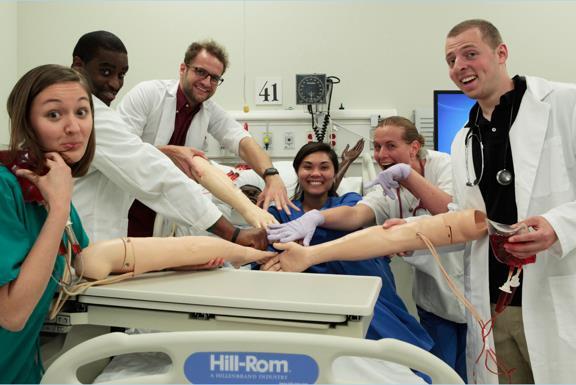
Dec. 18, 2013
New ‘lab’ embraces the art of entrepreneurship
Share this story

Matt Woolman has had his share of experience with both the business and art worlds.
As director of design entrepreneurship at Virginia Commonwealth University in Qatar from 2009 to 2011, Woolman was in charge of developing programming for the school’s graphic, fashion and interior design majors. After implementing a partnership with local businesses to inspire entrepreneurial development led by VCU Qatar students, Woolman wanted to develop a similar business-arts program for the Richmond campus. When he returned to Richmond in 2011, he was named the director of creative entrepreneurship for the VCU School of the Arts, responsible for business-oriented programming relating to all 16 arts majors offered by the university.
Hoping to bring business and art together, Woolman crafted ideas for an all-encompassing program that would provide artists with the entrepreneurial mindset needed to succeed as individually driven creators.
Those ideas culminated in the Creative Disruption Lab.
A three-part program designed by Woolman to create a new generation of “business artists” (the lab’s name for entrepreneurs), the CDL, which received a Quest Innovation Fund award from VCU, gives students a low-risk playing field where they can learn relevant practices, develop ideas alongside professors and like-minded students and work toward creating their own job opportunities after graduating.
“The idea was to address the lack of art-based jobs after graduation with ‘creative’ entrepreneurship, which is basically entrepreneurship as it emerges from the creative disciplines,” Woolman said.
The CDL’s three parts – education, incubation and collaboration – serve as the backbone for the ambitious program that Woolman hopes will help students succinctly prepare their ideas and projects for commercialization.
The education foundation of the CDL comes in the form of four 300-level arts classes. Courses such as “Piloting the Enterprise” and “Idea Accelerator” “introduce the language of the creative enterprise,” and “expose students to the processes and methodologies used to transform ideas and opportunities into sustainable business models,” respectively, according to the CDL website.
Incubation refers to the low-risk seed accelerator where students can develop and incubate business ideas, utilizing the abundance of resources both in the university and the community. The seed accelerator, expected to open this spring, will be housed in a renovated building on Broad Street near VCU’s Monroe Park Campus.
“The spirit of all this is to equip our students with a wider range of skills and options to translate their creative talents into jobs in the form of self-employment, business creation, product development and even working for other businesses or companies as entrepreneurial employees,” Woolman said.
Collaboration takes place during the CDL’s co-lab, an internship program for students who aren’t yet ready to come up with their own business ideas or launch a business, but who want to be a part of the development process. Student interns serve on teams assigned to develop a product or idea for commercialization, giving them exposure to the entrepreneurial process through working with others.
Woolman established the co-lab during the 2013 spring semester, attempting to gauge students’ interest in the lab and determine how they would approach a loosely stated idea.
“In the co-lab, we throw out an idea – a seed of a project that’s ambiguously defined – and we leave it to the students to help define it,” Woolman said.
The inaugural project proved to be a powerful introduction for the program.
As part of Google’s Glass Explorers program - the hands-on-test program for Google Glass, the technology giant’s upcoming head-based digital communication interface – Woolman’s students developed their own application for Google’s bridge between humans and technology.
“We told the students, ‘Here’s Google Glass, research it, then look at health care environments such as emergency rooms where it’s vital to communicate, research that and figure out what’s going on there,’” Woolman said.
The students researched the project, finding out critical information about hospital operations, including points where communication could be improved between areas of a hospital.
The students developed a scenario in which Google Glass could help facilitate an emergency situation within a hospital, designing an interface for the product’s eyeglass heads-up display and a video demonstrating the interface in use. As an undergraduate in the graphic design program, Kathryn Stern had the opportunity to work on the initial Google Glass team.
“The co-lab internship was fantastic … the opportunity to branch out and work with students in other majors was exciting,” said Stern, now a graduate student at VCU’s Brandcenter. “ Google’s announcement of the Glass Explorers program was also incredibly well timed.”
That’s the kind of outcome the co-lab produces, Woolman said.
“Students are put on the spot with little information on an emerging technology, and they successfully develop an interesting application,” he said.
Unlike some art and design schools with more pragmatic business skills programs – which include classes such as accounting and marketing – the Creative Disruption Lab provides an all-encompassing look at entrepreneurship skills that can emerge from within an arts school.
“It’s a very new idea, and I’d like to think we’re taking the lead and becoming the model for both public and private schools,” Woolman said.
Subscribe for free to the weekly VCU News email newsletter at http://newsletter.news.vcu.
Subscribe to VCU News
Subscribe to VCU News at newsletter.vcu.edu and receive a selection of stories, videos, photos, news clips and event listings in your inbox.











